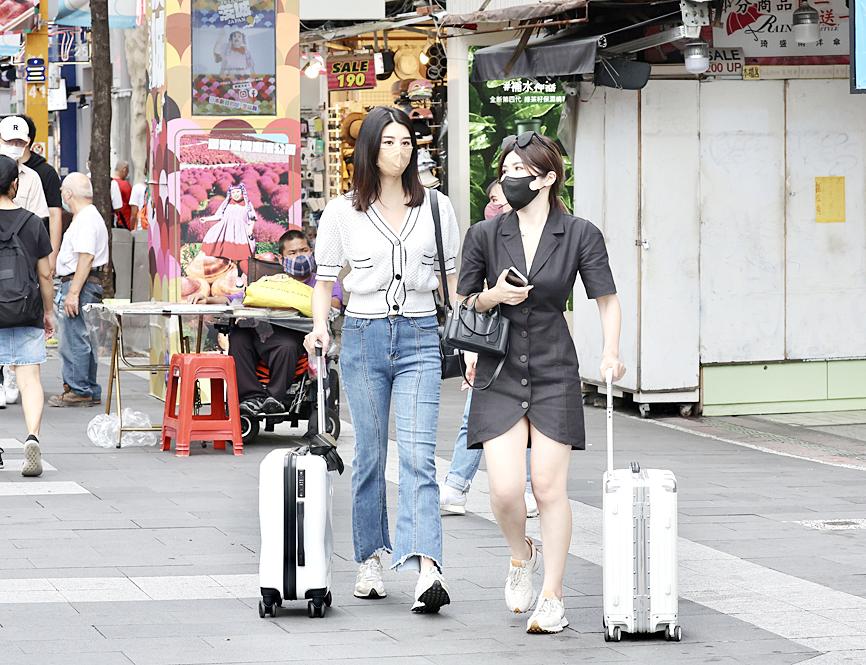The Central Epidemic Command Center (CECC) intends to accelerate plans to fully reopen Taiwan’s borders once the next COVID-19 wave subsides, in October at the earliest.
Addressing the Taipei Tourism Exposition yesterday, President Tsai Ing-wen (蔡英文) said she has instructed the Executive Yuan to establish a timeline and draft measures for reopening the nation’s borders for tourism.
A Cabinet official yesterday afternoon said it was carefully considering the matter and would reassess the situation next month.

Photo: CNA
The government has been preparing to ease border restrictions, but the schedule has been continually pushed back due to increasing infection rates in nearby countries, Premier Su Tseng-chang (蘇貞昌) said at the Green Dining Guide Annual Awards Ceremony.
The government must be careful and only ease border controls once all sectors are satisfied that doing so would not endanger lives, Su said.
Deputy Minister of Health and Welfare Victor Wang (王必勝), who heads the CECC, told a regular news conference that the center must balance pandemic control, tourism and the economy.

Photo: CNA
The CECC estimates that infection rates of the Omicron BA.5 subvariant of SARS-CoV-2 could peak around the end of next month or early October, Wang said, adding that infections in northern Taiwan are increasing.
However, changes must be gradual, by for instance removing the “one person, one room” policy during the self-health management period or increasing the maximum number of people allowed to enter Taiwan, Wang said.
The possibility of allowing tour groups to enter and shortening quarantine would be implemented in stages, but could accelerate once the coming wave passes, Wang said, adding that the CECC has received the Tourism Bureau’s draft guidelines for travel agencies handling group tours.
The center commended the bureau for thinking ahead, although many of the guidelines have not been finalized, Wang said, adding that the CECC plans to consult the bureau as plans are refined.
Meanwhile, the Ministry of Education and local governments have agreed on school pandemic measures as the new academic year is set to begin, the CECC said.
For the first four weeks, if one person in a class is diagnosed with COVID-19, the entire class is to be canceled or must study remotely for three days, it said.
Students would undergo rapid screening tests if a case is detected in their school, and each student is to have the option to take days off if they are unsure whether they are infected, it said.
The ministry is to announce the new policy on Monday.
Additionally, the CECC announced that vaccinations for young children are to start from Saturday next week after it received 1.28 million doses of the Pfizer-BioNTech COVID-19 vaccine for children aged 6 months to 4 years.
The announcement came as the CECC reported 22,559 new domestic cases of COVID-19 and 32 deaths from the disease.
Additional reporting by Lee Hsin-fang and CNA

Right-wing political scientist Laura Fernandez on Sunday won Costa Rica’s presidential election by a landslide, after promising to crack down on rising violence linked to the cocaine trade. Fernandez’s nearest rival, economist Alvaro Ramos, conceded defeat as results showed the ruling party far exceeding the threshold of 40 percent needed to avoid a runoff. With 94 percent of polling stations counted, the political heir of outgoing Costa Rican President Rodrigo Chaves had captured 48.3 percent of the vote compared with Ramos’ 33.4 percent, the Supreme Electoral Tribunal said. As soon as the first results were announced, members of Fernandez’s Sovereign People’s Party

MORE RESPONSIBILITY: Draftees would be expected to fight alongside professional soldiers, likely requiring the transformation of some training brigades into combat units The armed forces are to start incorporating new conscripts into combined arms brigades this year to enhance combat readiness, the Executive Yuan’s latest policy report said. The new policy would affect Taiwanese men entering the military for their compulsory service, which was extended to one year under reforms by then-president Tsai Ing-wen (蔡英文) in 2022. The conscripts would be trained to operate machine guns, uncrewed aerial vehicles, anti-tank guided missile launchers and Stinger air defense systems, the report said, adding that the basic training would be lengthened to eight weeks. After basic training, conscripts would be sorted into infantry battalions that would take

GROWING AMBITIONS: The scale and tempo of the operations show that the Strait has become the core theater for China to expand its security interests, the report said Chinese military aircraft incursions around Taiwan have surged nearly 15-fold over the past five years, according to a report released yesterday by the Democratic Progressive Party’s (DPP) Department of China Affairs. Sorties in the Taiwan Strait were previously irregular, totaling 380 in 2020, but have since evolved into routine operations, the report showed. “This demonstrates that the Taiwan Strait has become both the starting point and testing ground for Beijing’s expansionist ambitions,” it said. Driven by military expansionism, China is systematically pursuing actions aimed at altering the regional “status quo,” the department said, adding that Taiwan represents the most critical link in China’s

EMERGING FIELDS: The Chinese president said that the two countries would explore cooperation in green technology, the digital economy and artificial intelligence Chinese President Xi Jinping (習近平) yesterday called for an “equal and orderly multipolar world” in the face of “unilateral bullying,” in an apparent jab at the US. Xi was speaking during talks in Beijing with Uruguayan President Yamandu Orsi, the first South American leader to visit China since US special forces captured then-Venezuelan president Nicolas Maduro last month — an operation that Beijing condemned as a violation of sovereignty. Orsi follows a slew of leaders to have visited China seeking to boost ties with the world’s second-largest economy to hedge against US President Donald Trump’s increasingly unpredictable administration. “The international situation is fraught